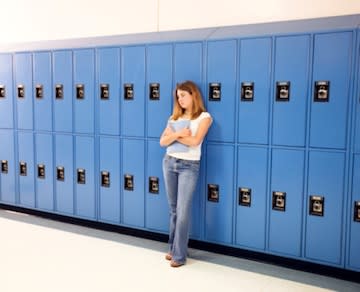 The Lookout
The LookoutWhy geeks make better adults than the in-crowd

What makes you a total weirdo in high school is most likely the ticket to your future success, according to a new nerd wish-fulfillment book called the Geeks Shall Inherit the Earth, by reporter Alexandra Robbins.
Robbins followed seven self-described outsiders at public and private high schools for a year and concluded that what makes kids popular—conformity, aggression, visibility, and influence—won't make them happy or successful after they graduate. She distinguishes between perceived popularity, when peers say someone is at the top of the social hierarchy, and actual popularity, when peers report actually liking someone. Her book focuses on the former, a state that Robbins says tends to evaporate outside of the high school gate.
In good news for nerds everywhere, what makes people unpopular in the hallways of high school, mainly an unwillingness to conform, tends to translate into success as an adult. Robbins lists several companies—including Yahoo!—that prioritize hiring quirky individuals who shun conventional thinking. She also name-checks historical and current celebrities, including director Steven Spielberg (who was taunted for being Jewish in high school) and Lady Gaga (a self-described former theater "freak"), whose weirdness led to later fame. (Other now-validated former outsiders she touts: Steve Jobs, Taylor Swift, Bruce Springsteen and Angelina Jolie.)
Interestingly, Robbins found a professional loophole to the theory that what makes us weird will help us in adult life--teachers.
Drawing on hundreds of interviews, Robbins discovered that some teachers face pressure to conform and fit into a rigid hierarchy much as their students do. "They were saying that the teachers' lounge is just as scary a place as the cafeteria, socially. If you get back into that setting, something about school can cause you to regress and care about popularity that way."
Teachers formed official cliques that students and administrators knew about. In the book, Robbins writes that one Illinois middle school had an invite-only teachers' clique whose name was PIGS, people in good standing: "When an older teacher's beloved dog died, they stole a photo of the dog and built a mock shrine to it, pretending to mourn." The PIGS also ganged up on another colleague by refusing to share teaching materials with her. She has since left the school.
"It's just so disturbing that even in schools that are paying thousands of dollars [for] experts to come in with anti-bullying programs … even in those very schools the teachers are not modeling appropriate social behavior," she told The Lookout.
Robbins is quick to point out that she didn't observe the cliquey behavior among teachers in every school. And, as surveys have shown, bullying behavior can happen in many workplace settings.
The book is full of buzzy details about cruel and popular girls that are sure to make parents gasp. She writes of a clique in Arkansas called The Exclusives that dictates its teen members wear heels every day and report weight gain to the group--much like The Plastics in the comedy "Mean Girls." Another group of girls in Texas requires members to keep the price tags on their clothes to prove their fashion bona fides.
Even if the kids in these cliques are momentarily on top of the world, Robbins says the traits they are learning could be toxic in their future lives. "When you are in the popular crowd you are more likely to be conformist, you are more likely to hide aspects of your identity in order to fit into the crowd, you are more likely to be involved in relational aggression, you are more likely to have goals of social dominance rather than forming actual true friendships," Robbins says, pausing for a breath. "You are more likely to let other people pressure you into doing things. None of those things is admirable or useful as adults."
Meanwhile, the outsiders, including a young girl who earnestly told Robbins she had to accept that she would be on the bottom of the social food chain for the rest of her life, "are much more self-aware and honestly much braver than the popular students. They are sticking to being themselves in the environment that makes it most difficult to do so."
So what is leading kids (and sometimes teachers) to enforce rigid hierarchies in high school? Robbins singles out the No Child Left Behind federal education law as one culprit. "When you gear the classroom to a standardized test you take away the creativity and the spontaneity and innovation and the fun out of learning," she says. "And when schools devalue those qualities they're basically telling students to devalue those qualities in each other."
Robbins doesn't offer up any data to back up her claim about the link between standardized testing and a narrowing definition of popularity. And education reformers have touted the importance of such testing as the only way to ensure all of the country's kids are learning, especially given the persistent academic achievement gaps among minority and low-income students.
Schools can empower an atmosphere of inclusion, Robbins says, by mandating assigned seating in the cafeteria at least once a month, and by providing loose chairs so that people can move from table to table instead of being forced to choose and commit to a clique.
"Treat all student groups equally," she adds, "because otherwise you're telling the students which groups to glorify. Display trophies for the chess team the same way you display trophies for the football team."
Outside of school, Robbins suggests that parents should "focus more on celebrating the uniqueness and the individuality of their children rather than the pursuit of certain goals."
(Stock image: Comstock)
